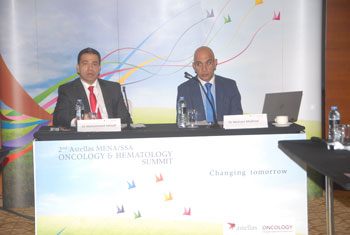 Dubai, United Arab Emirates; 13 March 2016: During the Regional Oncology and Haematology Summit hosted by Astellas Middle East North & Sub Saharan Africa (MENA/SSA), a specialised briefing with regional patient groups and members of the press was held to discuss prostate cancer, cancer patients’ experiences and the latest statistics for the region. As a matter of fact, the reported incidence rate of prostate cancer in the MENA region is approximately five times lower than that of the USA.1 However, the mortality to incidence ratio of prostate cancer is five times higher in the MENA region than in the USA.
Dubai, United Arab Emirates; 13 March 2016: During the Regional Oncology and Haematology Summit hosted by Astellas Middle East North & Sub Saharan Africa (MENA/SSA), a specialised briefing with regional patient groups and members of the press was held to discuss prostate cancer, cancer patients’ experiences and the latest statistics for the region. As a matter of fact, the reported incidence rate of prostate cancer in the MENA region is approximately five times lower than that of the USA.1 However, the mortality to incidence ratio of prostate cancer is five times higher in the MENA region than in the USA.
Dr. Mohsen Mokhtar, Professor of Clinical Oncology at the Cairo University Kasr El Aini Medical School in Egypt and Chairman of the patient group CanSurvive in Egypt commented: “The lower incidence rate of prostate cancer can be related to many factors in the healthcare system and in population across the region. These factors can include access to health care, level of awareness on prostate cancer, quality of healthcare services, age, genetics, and hormonal issues. The higher mortality rate may be due to the fact that in this region men visit their doctors with late stage symptoms.”
Around 200 internationally and regionally renowned oncologists, haematologists and uro-oncologists from the Middle East and North Africa, in addition to international speakers from Europe & USA, met in Dubai to discuss practice methods and the latest findings related to prostate cancer and haematological diseases.
“In this part of the world, men visit their doctors with late stage symptoms. It is a frustrating reality as the possibility for a cure is greater with early diagnosis. In spite of this, there are several treatment options available to men even if they visit their doctor with later stage symptoms. There are hormonal therapies to full cancer treatment therapies that can be administered. Men should approach their doctors if they are in the risk category,”commented Dr. Mohammed Jaloudi, MD, Chairman of the Medical Oncology Department at Tawam Hospital in Al Ain, UAE.
Common prostate conditions can lead to urinary problems, erectile dysfunction, and/or infertility. Inflammation of the prostate gland can in some cases lead to cancer. The mortality rate for prostate cancer in the MENA region was recently recorded at 15,422 deaths in 2012 and it is expected to reach 19,861 deaths by 2020 according to a recent study.
Speaking during the Regional Oncology and Haematology Summit, Mr. Markus Weber, General Manager Astellas Pharma MENA/SSA stated: “Our therapeutic breakthroughs across our disease fields fall in line with our corporate ethos to put the patients first. By spreading awareness and involving patient groups in our summit, we hope that receiving a thorough briefing on prostate cancer will enable these organisations to return to their home countries and start a dialogue in the communities. First and foremost, we want to encourage men in this region to be vigilant about their health, to learn the facts, and hopefully receive an early diagnosis on their condition.”
Doctors in the region often advise patients above the age of 55 years to get screened for prostate cancer. The general theory is that most men in the region are not getting screened either due to lack of awareness or social inhibitions to discuss conditions of a sensitive nature.

